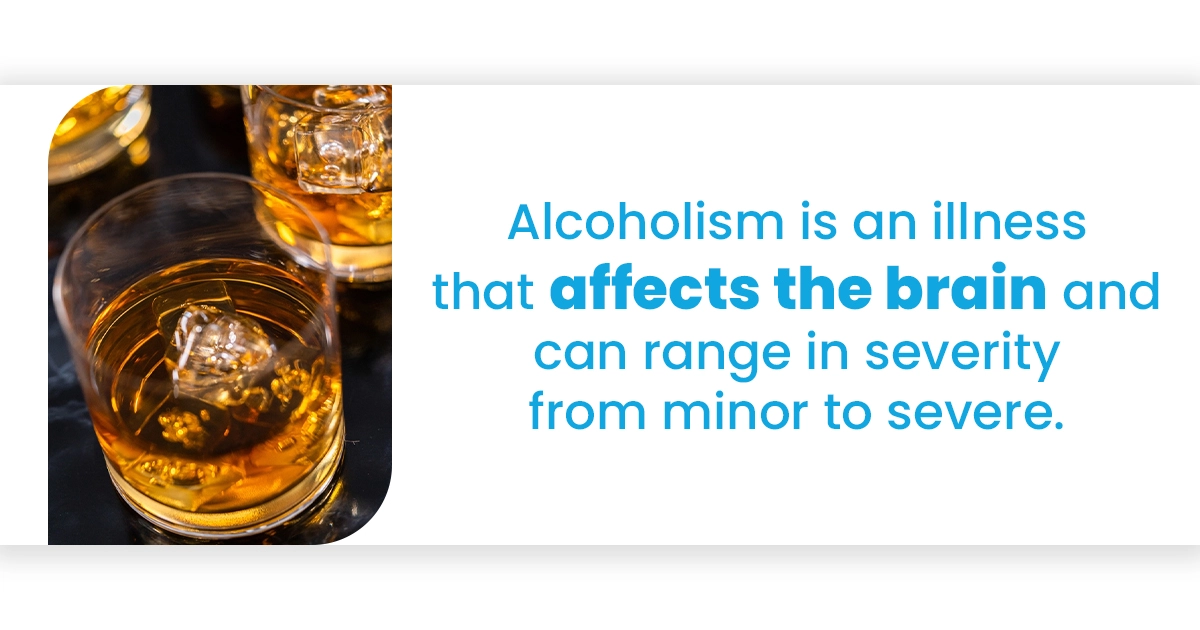
Alcohol use disorder (AUD), the medical term for alcoholism, is defined as an individual’s failure to reduce excessive alcohol consumption. Alcoholism is an illness that affects the brain and can range in severity from minor to severe.
Many people consume alcohol in moderation, which is summarized as one drink per day for women and two drinks per day for men. However, some individuals may acquire tolerance, requiring higher doses of alcohol to produce the same results, leading to the development of alcohol use disorder.
If those numbers seem small to you, you may be asking yourself, “Am I an alcoholic?”
Continue reading to learn the signs of alcoholism, risk factors, and available treatment options to get back to a toxin-free life.
Key Takeaways
A person’s negative drinking habits characterize alcohol abuse. Physical effects like brief blackouts or short-term memory loss and excessive mood swings may occur if you are excessively drinking.
You’ll find the following in this article:
- Alcohol use disorder (AUD) is a disease brought on by excessive alcohol consumption.
- Loss of control over alcohol consumption, including drinking even when it harms your relationships, career, education, or health, is a hallmark of AUD.
- Detox, cognitive behavioral therapy, medication, and support groups can help to get back to normal life.
Get professional help from The Haven Detox-South Florida. Call (561) 328-8627 to learn about our treatment programs.
Signs of Alcoholism
Alcohol consumption disorder can take many different shapes and exhibit many symptoms. Understanding the many phases and signs of alcoholism is essential to determining whether you or someone you care about may be at risk of developing alcoholism.
Following are some signs of alcohol addiction.
Early Signs of Alcoholism
If you relate to any of the following statements, ask your doctor about alcoholism treatment:
- Frequently drinking or staying out with your friends longer than you intended to.
- Unable to quit drinking despite your best efforts.
- Frequently suffering from hangovers as a result of drinking.
- Drinking or its after-effects cause problems with other obligations.
- Needing increasingly larger amounts of alcohol to achieve the same results over time.
The effects of alcohol abuse can be reversed if caught early. Take note as soon as these warning signs appear and seek help.
Behavioral Signs of Alcoholism
Knowing the behavioral signs of alcohol misuse can help you understand whether you or a loved one may be at risk.
These signs include:
- Drinking, despite how it affects your performance at work or in school.
- Hiding your drinking habits.
- Getting irritated or offended when someone inquires about your drinking habits and medical advice.
- Engaging in unsafe behaviors when under the influence, such as driving or getting into fights.
- Hiding your drinking habits.
- Feeling anxious or preoccupied with thoughts of alcohol.
- Engaging in fewer previously fun activities (sports, family events, etc.).
Physical Signs of Alcoholism
Too much alcohol consumption affects a person’s physical body in addition to their mental health.
Physical signs of alcoholism include:
- Slowed reaction times
- Blackouts due to drinking
- Poor coordination
- Memory impairment or lapses
- Slurred speech
- Physical health problems, such as cirrhosis
- Malnutrition
- Hair loss or thinning
- Dark circles under the eyes
Dangers of Alcohol Use Disorder
Alcohol consumption disorder has a range of short- and long-term health hazards.
The following are examples of short-term effects:
- Injuries such as burns, falls, vehicle accidents, and drownings
- Stillbirth, miscarriage, or fetal alcohol spectrum disorders in pregnant women
- Alcohol poisoning
- Violence
- Risky sexual behavior that might lead to an unexpected pregnancy or a sexually transmitted disease
When you drink a lot of alcohol regularly or over a short period, you face the danger of all these effects.
However, just because the night passed without a disaster doesn’t mean you are in the clear.
The long-term effects of alcohol abuse include:
- Liver, breast, colon, esophagus, mouth, and throat cancer
- Digestive issues
- Liver disease
- Heart disease and high blood pressure
- Compromised immune system, making getting sick more likely
- Social concerns, such as unemployment and damaged family relationships
- Mental health issues, such as anxiety and depression
- Problems with memory and learning, like low academic performance
As you can see, excessive alcohol use over time can lead to several serious problems and even the development of chronic diseases.
Treatment Options for Alcohol Dependency
In many circumstances, admitting a problem is the first step in addressing alcohol dependence or excessive drinking.
As with many health issues, the next step is to seek medical advice from a healthcare provider, typically your neighborhood G.P., who can recommend you to a specialist.
For those who have been given an alcohol use disorder diagnosis, there are various treatments available, like residential treatment programs, outpatient programs, and family therapy.
Ongoing treatment options can include:
Detoxification
One of the most important phases of treatment is detoxification or detox. For the body to get used to not having alcohol, detox requires quitting drinking entirely while under medical care.
A person may have symptoms of alcohol withdrawal during this time. A medical professional will make sure you are as comfortable as possible during the detox process.
Cognitive Behavioral Therapy
Cognitive behavioral therapy (CBT) can assist in altering harmful mental patterns that may result in young adults drinking. Small groups or one-on-one therapy sessions using cognitive behavioral techniques are both options.
This therapy focuses on pinpointing the emotions and circumstances that trigger binge drinking and managing stress that can trigger a relapse.
The goal is to alter mental patterns that result in alcohol abuse and to build the coping strategies needed to deal with everyday circumstances that could result in problem drinking.
Support Groups
Mutual aid organizations like Alcoholics Anonymous are valuable partly because of the network of supporters a person gains. The members of the support group can assist people in changing the way they think and how they behave around others and themselves.
Peer support for those giving up or reducing their drinking is offered by Alcoholics Anonymous (A.A.) and other 12-step groups.
When combined with medical experts’ treatment plans, mutual-support groups can add a powerful support layer.
Self-help groups are typically anonymous; thus, it is challenging for researchers to compare their success rates to those of groups facilitated by medical experts.
Medications
Many people are surprised to learn that there are medications on the market approved to treat alcoholism. The more current forms of these medications work by reversing the changes brought on by AUD in the brain.
Every authorized drug is non-addictive and can be used on its own and in combination with other forms of therapy.
Learn more information about these suggested treatments.
Prescribed treatments can also have a role in preventing relapse for some people who are trying to refrain from drinking.
The U.S. Food and Drug Administration (FDA) has approved three medications for curing alcohol dependence.
- Acamprosate makes it simpler to maintain sobriety.
- Disulfiram prevents the body from breaking down (metabolizing) alcohol, resulting in unpleasant sensations like nausea and skin flushing.
- Naltrexone can help people cut back on heavy drinking. Some people may decide not to drink while taking disulfiram due to those undesirable side effects.
Other medications are being tested to determine whether they effectively treat alcohol use disorder.
It is vital to remember that not everyone will respond to medical treatment.
If you are looking for help for yourself and your family members, get quality help from The Haven Detox-South Florida. We offer reliable service to assist people in getting back to a healthy life at manageable price tags.
Frequently Asked Questions (FAQ)
What is considered alcoholism?
The most severe type of problem drinking, where it is harmful to your health, is referred to as alcoholism. Alcohol abuse, alcohol addiction, and alcohol dependency are other names for alcoholism.Some people in recovery from alcohol dependence refer to themselves as alcoholics even though the term is no longer used in medical terminology.
An alcoholic frequently prioritizes drinking over all other commitments, such as work or family responsibilities. An alcoholic has developed a physical tolerance, which means they need to drink more alcohol to have the same effects. When they stop drinking, they experience withdrawal symptoms.
What are the three symptoms of an alcoholic?
The following are possible signs and symptoms of alcoholism:An inability to control your alcohol use.
Wanting to cut back on your drinking or failing to do so.
Having a strong desire or want to drink alcohol.
Avoid alcohol use disorder by practicing safe drinking habits. This means women should drink no more than one drink per day and men no more than two drinks per day. People over 65 should limit their alcohol intake to one drink per day.
How do I know I’m an alcoholic?
Alcoholism is more about the physical need to drink than it is about how much or how frequently someone drinks, making drinking an obsession or a need. The following are some typical signs of alcohol abuse:
Experiencing momentary memory loss or blackouts and displaying signs of excessive mood swings and irritation.
Making justifications for drinking, such as the need to unwind, manage stress, or feel normal.
Heal Body and Mind with The Haven Detox-South Florida
Alcohol addiction can cause negative consequences if left untreated. The Haven Detox-South Florida is your guide in breaking the addiction cycle.
At The Haven Detox South Florida, we offer effective addiction treatment programs, including residential treatment programs and SMART recovery, to help people get back to a healthy life.
Furthermore, our 24/7 customer support is pleased to answer your concerns regarding the admission process.
Call us at (561) 328-8627 to speak with our admission counselors.
Click here to learn more about our treatment programs and service charges.






